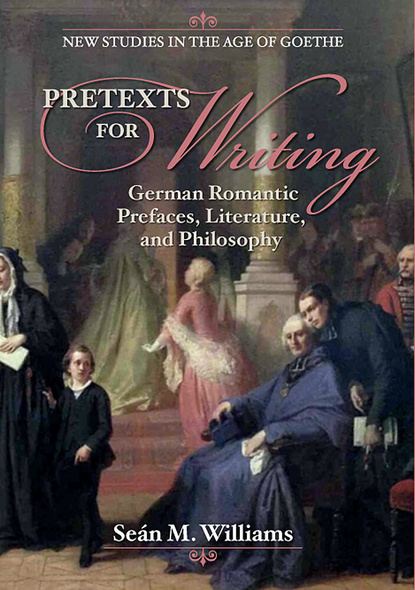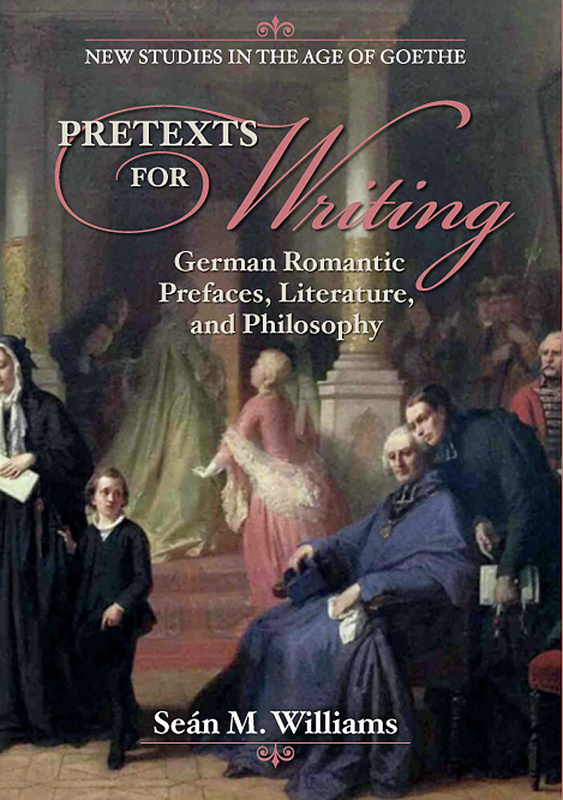Our shopping cart is currently down. To place an order, please contact our distributor, UTP Distribution, directly at utpbooks@utpress.utoronto.ca.

278 pages, 6 x 9
Paperback
Release Date:01 Mar 2019
ISBN:9781684480524
Hardcover
Release Date:01 Mar 2019
ISBN:9781684480531
Pretexts for Writing
German Romantic Prefaces, Literature, and Philosophy
SERIES:
New Studies in the Age of Goethe
Bucknell University Press
Around 1800, print culture became a particularly rich source for metaphors about thinking as well as writing, nowhere more so than in the German tradition of Dichter und Denker. Goethe, Jean Paul, and Hegel (among many others) used the preface in order to reflect on the problems of writing itself, and its interpretation. If Sterne teaches us that a material book enables mind games as much as it gives expression to them, the Germans made these games more theoretical still. Weaving in authors from Antiquity to Agamben, Williams shows how European–and, above all, German–Romanticism was a watershed in the history of the preface. The playful, paradoxical strategies that Romantic writers invented are later played out in continental philosophy, and in post-Structuralist literature. The preface is a prompt for playful thinking with texts, as much as it is conventionally the prosaic product of such an exercise.
Published by Bucknell University Press. Distributed worldwide by Rutgers University Press.
Published by Bucknell University Press. Distributed worldwide by Rutgers University Press.
Pretexts for Writing discusses the history of the literary and philosophical self-authored preface in the German speaking world around 1800 with an intensity and analytical depth previously unachieved in scholarship.
Recommended.
a study of tremendous academic rigor with original insights. it shows deep knowledge of both eighteenth- and nineteenth-century German literature and philosophy and the many conversations in contemporary literary studies pertaining to them.it is an achievement in scholarship pertaining to the age of Goethe, romanticism, and literary studies at large.
This debut book, in short, contains much that is scintillant and surely announces the arrival of an important new scholarly voice in Germanistik.
This book is perceptive, timely, and ambitious: perceptive in that it zeroes in on serious gaps in research, the exploration of which may alter our views of eighteenth-century German literature.
Pretexts for Writing is an insightful, original, and persuasive work—compelling pretexts for reading.'
Pretexts for Writing discusses the history of the literary and philosophical self-authored preface in the German speaking world around 1800 with an intensity and analytical depth previously unachieved in scholarship.
Recommended.
a study of tremendous academic rigor with original insights. it shows deep knowledge of both eighteenth- and nineteenth-century German literature and philosophy and the many conversations in contemporary literary studies pertaining to them.it is an achievement in scholarship pertaining to the age of Goethe, romanticism, and literary studies at large.
This debut book, in short, contains much that is scintillant and surely announces the arrival of an important new scholarly voice in Germanistik.
This book is perceptive, timely, and ambitious: perceptive in that it zeroes in on serious gaps in research, the exploration of which may alter our views of eighteenth-century German literature.
Pretexts for Writing is an insightful, original, and persuasive work—compelling pretexts for reading.'
Seán M. Williams is a lecturer in German and European cultural history in the School of Languages and Cultures at the University of Sheffield, UK, following an appointment as Vice-Chancellor’s Fellow. He was previously lecturer (“wissenschaftlicher Assistent”) in German and comparative literature at the University of Bern, Switzerland. He has publishedon German literature and philosophy around 1800, in comparative contexts.
Abbreviations ... v
A Note on Translations... vi
Introduction: What Prefaces Are Not: Pedantic Notes ... 1
Historical Context and Precedent
Paratextual Theory and Textual Autonomy
Rhetorical Caesura: Comprehending Romanticism
Writing to Write
1 Goethe: A Playful and Resistive Set of Preface Strategies ... 66
Zero Prefaces
Ambiguous Prefaces
Poetic Prefaces
Embedded Prefaces
Belated Prefaces
A Hypertrophic Preface
2 Jean Paul: Autoprefacing ... 144
Baroque Beginnings: The Preface as Brow, Morsel, and Porch
Reviewers and Readers
Writers and Preface-Writers
Prefatory Procrastination and Textual Foreplay
The Logic of Length; Or, Digressive Fragmentation
Countering Captatio Benevolentiae? Beyond Eloquence
Conclusion: Preface to Prefatorial Philosophy (and Theory)
3 Hegel: Prefatorial Polemic Becomes Philosophy ... 237
Starting with Sterne? Literature and Philosophy around 1800
Descriptive Induction versus Performative Prefacing
A New Style of Preface
Sublation of Conventional Prefatory Content
A Superior Preface
Philosophical and Rhetorical Preface Paradigms
Post-Structuralist Postscript
Conclusion... 311
Acknowledgements ... 328
Bibliography ... 330
Index ... 371
About the Author ... 372





